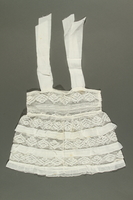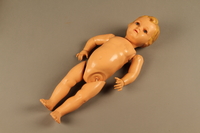Overview
- Brief Narrative
- Handmade embroidered dress with a floral design worn by Bienonida Behar (later Ezoory) as a baby in Skopje, Yugoslavia (now North Macedonia) before and during the Holocaust. Her parents Aharon and Rebeka had a very close friendship with Aharon’s business partner Aleksander Todorov and his wife, Blaga. When the Axis invaded Yugoslavia and partitioned the country in April 1941, Skopje fell under Bulgaria’s control. The Bulgarian authorities quickly created new legislation that restricted Jewish life. On March 11, 1943, the Jewish populations of Macedonia were rounded up by Bulgarian and German forces and taken to the Monopol tobacco warehouse. Before they were taken away, Bienonida’s parents left her with Aleksander and Blaga. At the end of March, Bienonida's parents, along with the other Jewish prisoners, were deported to Treblinka killing center in German occupied Poland where they were murdered upon arrival. The Todorovs raised Bienonida as their own daughter. In 1952, when she was 13 years old, Bienonida learned she was Jewish and the truth about her parents. In October that same year, Bienonida left Yugoslavia for Israel. She studied nursing and married a businessman. On January 6, 1980, Yad Vashem recognized Aleksandar and Blaga Todorov as Righteous Among the Nations for saving Bienonida.
- Date
-
use:
1939-1944
- Geography
-
use:
Skopje (Macedonia)
- Credit Line
- United States Holocaust Memorial Museum Collection, Gift of Bienonida Ezoory
- Contributor
-
Subject:
Bienonida Ezoory
- Biography
-
Bienonida Ezoory (née Behar, b. 1939) was born in Skopje, Yugoslavia (now North Macedonia) to Aharon (1906-1943) and Rebeka Koen Behar (1917-1943). Aharon was born in Zemun, Austria-Hungary, but his father, Moshe, a Rabbi, moved the family to Skopje in 1919. Aharon owned several electric stores with his gentile business partner, Aleksander Todorov. Aharon married Rebeka on June 12, 1938. Aharon and Rebeka were very close friends with Aleksander and his wife Blaga. During Bienonida’s first years, the families spent a great deal of time together.
On April 6, 1941, Yugoslavia was conquered by Axis forces and was partitioned between Germany, Italy, Hungary and Bulgaria, with Skopje falling under Bulgarian control. Bulgarian authorities passed many antisemitic laws that restricted the everyday lives of the Jewish community. In October, Jews were banned from engaging in commerce or industry, and all existing Jewish businesses had three months to transfer ownership or sell their assets to non-Jews, forcing Aharon to relinquish his share of the business.
Fearing for their friends’ safety, Aleksander and Blaga acquired false identity papers and transport for Bienonida and her family to Albania. On the trip to the Albanian border, the Behars sighted guards and police, and fearing arrest, they returned to Skopje. On March 11, 1943, the Jewish population of Skopje, including Aharon and Rebeka, was rounded up by Bulgarian and German forces and imprisoned at the Monopol tobacco warehouse. Before their removal, Rebeka and Aharon were able to hide Bienonida with the Todorovs. The warehouse was chosen for its ability to hold a large number of people and its proximity to the railroad. Later in the day, the Skopje Jewish prisoners at the warehouse were joined by the Jewish communities of Bitola and Štip. Virtually the entire Jewish population of Macedonia was now imprisoned in Monopol. The prisoners were given little food, few blankets, and were searched, beaten, and humiliated. Women and girls were raped. Later in March, the prisoners were boarded into railroad cars and deported to Treblinka killing center in German occupied Poland where they were murdered upon arrival.
Aleksander and Blaga changed Bienonida’s name to Kristina and raised her as their own daughter. The couple took a great risk concealing a Jewish child. They were visited from time to time by the Bulgarians, who suspected that the girl was really Jewish. At times they were forced to send her to live with relatives in nearby villages for her protection. In November 1944, Skopje was liberated by the Macedonian National Liberation Army, and the Todorovs continued to raise Bienonida, loving her as their own daughter. They wanted to protect her from the horrible truth of her parents’ fate and did not tell her about her true heritage. In 1947 Blaga gave birth to a son, Sergai. During the same year the Communists took over the business and confiscated their apartment and all their possessions including a package for Bienonida that had been left by her true parents. The family then fled to Opatia, Italy. There, Aleksander and Blaga were imprisoned by communist forces and Bienonida took care of baby Sergai until Aleksander’s aunts came and took them to Belgrade two weeks later. After three months, Blaga was released and returned to Skopje with Bienonida and Sergai. Aleksander was released in 1952 and rejoined the family in Skopje.
When she was 13 years old, Bienonida learned she was Jewish and the Todorovs were not her birth parents. To confirm the truth she went to the Jewish community in Skopje to find out if they knew she was Jewish. There she learned the truth about her parents and decided to move to Israel. In October 1952, she left for Israel on the ship, Negba, with a few other Jewish children from Yugoslavia. Upon her arrival in Israel, Bienonida lived in a kibbutz. In 1954 she enrolled in the army and was released in 1956. Bienonida studied nursing and became a clothing model. In 1961, she married a businessman who ran a travel business. They had 2 children and 3 grandchildren. On January 6, 1980, Yad Vashem recognized Aleksandar and Blaga Todorov as Righteous Among the Nations for their actions.
Physical Details
- Classification
-
Clothing and Dress
- Category
-
Children's clothing
- Object Type
-
Child's dress (lcsh)
- Genre/Form
- Dresses.
- Physical Description
- Baby girl’s handmade, short sleeve, off white gauzy cotton dress with a colorful embroidered floral design. The dress has a keyhole neckline trimmed with red blanket stitched edging and a single white button on the right side. Just below the neckline is a row of alternating red and blue flowers inside green circles. The design is flanked by a red, black, and gray geometric border with a repeating blue and red floral design along the top. The same pattern is repeated on the bottom of the skirt, just above the hem. Embroidered on the center of the skirt and the sleeves are several small red crosses. The short, puff sleeves are sewn to the bodice and gathered at the openings. The dress has a seam on the right side. The dress is yellowed from age and there are several small brown stains on the lower back.
- Dimensions
- overall: Height: 13.125 inches (33.338 cm) | Width: 7.000 inches (17.78 cm)
- Materials
- overall : cotton, thread, plastic
Rights & Restrictions
- Conditions on Access
- No restrictions on access
- Conditions on Use
- No restrictions on use
Keywords & Subjects
- Topical Term
- Holocaust survivors--Yugoslavia--Biography. Holocaust, Jewish (1939-1945)--Yugoslavia--Personal narratives. Jews--Persecutions--Yugoslavia--Biography. Emigration and immigration--Israel. Righteous Gentiles in the Holocaust--Yugoslavia. Jewish children in the Holocaust.
- Geographic Name
- Skopje (North Macedonia)
Administrative Notes
- Legal Status
- Permanent Collection
- Provenance
- The dress was donated to the United States Holocaust Memorial Museum in 2018 by Bienonida Ezoory.
- Record last modified:
- 2022-07-28 21:51:31
- This page:
- https://collections.ushmm.org/search/catalog/irn618403
Download & Licensing
In-Person Research
- By Appointment
- Request 21 Days in Advance of Visit
- Plan a Research Visit
- Request to See This Object
Contact Us
Also in Bienonida Ezoory collection
The collection consists of a doll and two dresses relating to the experiences of Bienonida Ezoory in Yugoslavia (now North Macedonia) before and during the Holocaust.
Date: 1939-1945

Lace dress worn by a Jewish baby in Yugoslavia before and during the Holocaust
Object
Handmade lace dress with a floral design worn by Bienonida Behar (later Ezoory) as a baby in Skopje, Yugoslavia (now North Macedonia) before and during the Holocaust. Her parents Aharon and Rebeka had a very close friendship with Aharon’s business partner Aleksander Todorov and his wife, Blaga. When the Axis invaded Yugoslavia and partitioned the country in April 1941, Skopje fell under Bulgaria’s control. The Bulgarian authorities quickly created new legislation that restricted Jewish life. On March 11, 1943, the Jewish populations of Macedonia were rounded up by Bulgarian and German forces and taken to the Monopol tobacco warehouse. Before they were taken away, Bienonida’s parents left her with Aleksander and Blaga. At the end of March, Bienonida's parents, along with the other Jewish prisoners, were deported to Treblinka killing center in German occupied Poland where they were murdered upon arrival. The Todorovs raised Bienonida as their own daughter. In 1952, when she was 13 years old, Bienonida learned she was Jewish and the truth about her parents. In October that same year, Bienonida left Yugoslavia for Israel. She studied nursing and married a businessman. On January 6, 1980, Yad Vashem recognized Aleksandar and Blaga Todorov as Righteous Among the Nations for saving Bienonida.

Baby doll owned by a Jewish Yugoslavian girl in hiding
Object
Celluloid doll made by the German firm, Buschow & Beck, and given to Bienonida Behar (later Ezoory) as a child in Skopje, Yugoslavia (now North Macedonia) during the Holocaust. Her parents Aharon and Rebeka had a very close friendship with Aharon’s business partner Aleksander Todorov and his wife, Blaga. When the Axis invaded Yugoslavia and partitioned the country in April 1941, Skopje fell under Bulgaria’s control. The Bulgarian authorities quickly created new legislation that restricted Jewish life. On March 11, 1943, the Jewish populations of Macedonia were rounded up by Bulgarian and German forces and taken to the Monopol tobacco warehouse. Before they were taken away, Bienonida’s parents left her with Aleksander and Blaga. At the end of March, Bienonida's parents, along with the other Jewish prisoners, were deported to Treblinka killing center in German occupied Poland where they were murdered upon arrival. The Todorovs raised Bienonida as their own daughter. In 1952, when she was 13 years old, Bienonida learned she was Jewish and the truth about her parents. In October of that same year, Bienonida left Yugoslavia for Israel. She studied nursing and married a businessman. On January 6, 1980, Yad Vashem recognized Aleksandar and Blaga Todorov as Righteous Among the Nations for saving Bienonida.



